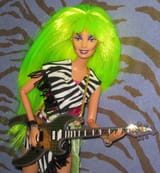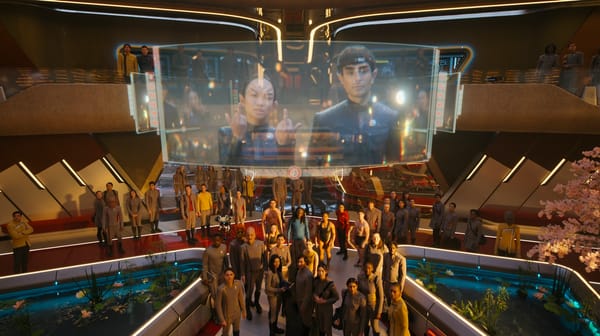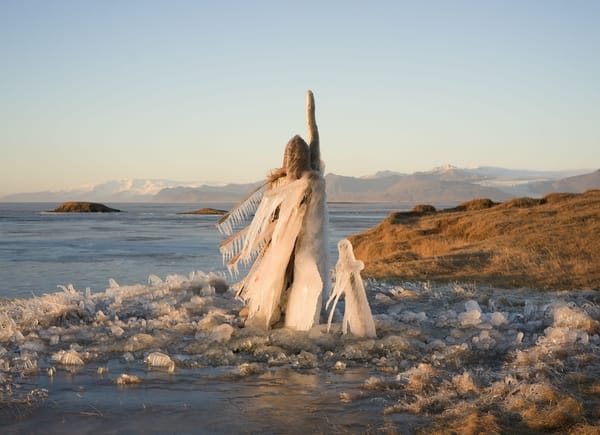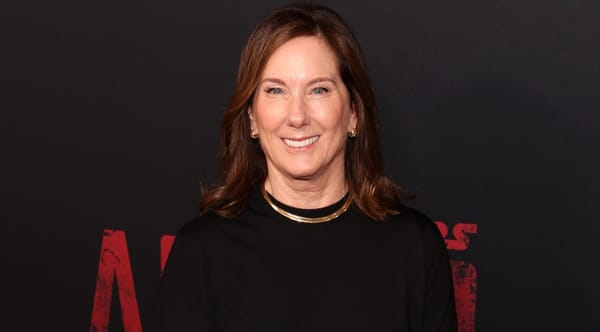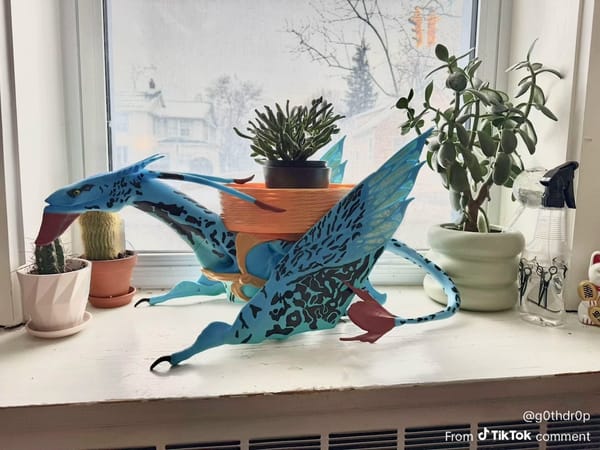Some of the Jedi were gardeners
A short story

I’m in Japan this week. Here’s a Star Wars story I wrote over the summer, based on a few strands I was thinking about. It contains neither stars nor wars and does not require much understanding of the saga.
I do not, nor have I ever, owned the rights to Star Wars, and I shall earn no money off this, Disney, I promise.
Dagen pressed his palms to the cold soil and tried, no did, no tried, to make the sound of the planet go away.
Not the planet herself, though. Coruscant was blameless in this. The sound Dagen wanted to banish from his sensorium was everything that had happened recently; the ten thousand generations of metal cladding that had shackled the world in two trillion teeming lives not its own, these buzzing beings that now not only filled warrens across the entire surface of the planet but flew through her skies like hiveless bees. Coruscant, in her way, had welcomed them. Coruscant, Dagen knew, had been roused to generosity towards her newcomers, though this had happened so far behind living memory that the very dialects spoken by the surface-dwellers would be incomprehensible to Dagen if he heard them today. A world, Coruscant “thought” in millennia, not microseconds. It was all Dagen could do not to pound his fists upon the ground in the grossest, greenest envy.
It wasn’t that Dagen hated the countless beings who made Coruscant their home. It was only that he could not, for all his meditations and any number of stern chats with the Masters, begin to fathom why the Jedi had built their temple here.
It was a world of cataclysmic distraction — again, not Coruscant’s fault! Politicking, and soirees, and the operas and casinos and the skyways choked to bursting with hovercars, a ceaseless horizontal waterfall of life made metal, which could be watched without end from the copper spires of the Jedi Temple. The spires were, themselves, lifeless too. Duracrete and transparasteel, and ancient marble from a hundred member worlds, the greatness of the Republic given form in the sanctuary of its protectors, the Jedi Knights.
And there was only one garden in the whole place.
But deep below that garden, as Dagen’s palms pressed into the cold richness of the soil, Dagen could feel the planet, too. And her message to him, delivered languidly, like the gentle flick of a napping lothcat’s tail, was always the same.
Let them grow.
“Talking to the planet again?”
Dagen jerked upright, brushing his loamy palms over his already-quite-dirty tabard. Other Jedi assigned to the garden wore coveralls while working, but Dagen never saw the point. It wasn’t as though he were wearing his dress robes. If mission robes were good enough for unpredictable assignments on faraway worlds, they were good enough for the garden of the Jedi Temple on Coruscant. (And besides: he had spent more than a few nights outfitting the inside of his rough-spun brown cloak with several dozen pockets of varying size, to carry his tools. The regular coveralls only had four pockets apiece.)
Master Ondiona was wearing her dress robes. They all but sparkled, the golden inlay against white cloth beating the noonday sun back into Dagen’s eyes so harshly he squinted. Assembly, Dagen thought with a lurch in his stomach. If the sun were already this bright, he’d almost certainly…
“Missed it,” the Master finished for him. Forty years old, with a bright Northern Coruscanti accent, Master Ondiona had her hands on her hips and one toe on the edge of the flower bed, but if she was exasperated with Dagen, she wasn’t showing it. Her eyes seemed to take the boy in — his dirty tabard, his many pockets, the mite that was nipping irksomely behind his right ear — with some other kind of feeling… though, as usual, Dagen couldn’t work out what that feeling was.
“Apologies, Master,” he mumbled, clasping his hands together in his robes and offering a slight bow of his head. “It won’t happen again.”
“Of course it will,” Ondiona chirped. “Your friends and I only missed you, is all. What are you working on?”
Dagen found it hard to believe that his crèche-mates had missed him — less so that they fell within the dimensions of what regular people might call “friends” — but he chose not to argue the point.
“Trying to sense whether the Gladiolixes I planted in semester two will be joining us anytime soon,” he said.
“You can’t bring them up yourself?” Ondiona asked, and then almost immediately corrected herself with a subtle nod of her head. “You won’t bring them up yourself.”
“No, Master.”
“Well,” she said. “A semester is a long time to leave a bed unplanted. Our colleagues depend on the Temple Gardens as a peaceful pathway to the Living Force… well, of course, you know all that.”
She took an easy seat on the edge of the bed, half-turned inward, as if checking the soil for any telltale shoots. But of course, there were none. “Let me try,” she said, and held her right hand out gently, the palm a span or two above the earth.
“Please don’t…” Dagen blurted. But Ondiona had already closed her eyes.
She opened them again, and frowned. “Dagen,” she sighed. “There’s very little point continuing to have the garden as your primary duty of care if you won’t actually do any gardening.” If her intention were to chide her student, there was very little of it in her voice. Actually, to Dagen’s ear, it sounded more like… sadness? But he often found the others’ emotions — not just the Master’s; all of the other people he knew in the Temple, and the other Padawans, and especially his crèche-mates — confusing.
Dagen felt it in the environment more than he sensed it in himself; this reproach. His own resentment. It were as though the sky darkened two shades, even though the weather grid still dutifully kept away any hint of a cloud until the next scheduled rainfall. The air seemed to choke with petrichor, although Dagen was sure there was none. He was simply angry.
It was always like this for Dagen; he didn’t feel his feelings in his body, almost ever. They always seemed, to him, to happen in the environment around him instead. None of the others could see this, of course; nor did they seem to feel their feelings the same way. Dagen was simply different.
“My boy,” Ondiona said, standing, and putting two warm hands on each of Dagen’s shoulders. “It’s all right to be angry with me. It’s also all right if you don’t understand.”
“I don’t.” He couldn’t meet her eyes, and rued the hot sting he felt behind his own.
“I’m here to help you,” his Master said gently. Dagen could only nod quickly, willing the threatened tears to dwindle back where they came from.
“Why can’t we… she doesn’t…” Dagen stumbled over his own words. “It feels hateful, to use the Force to make them grow. It feels…”
“What?” There was genuine concern in Ondiona’s voice. Dagen’s eyes darted to hers, only for an instant; in that instant, he saw her sky-blue eyes gazing back at him with such a depth of compassion that he felt bruising shame at all his resentments.
He couldn’t finish what he’d tried to say. He didn’t have to. “It feels like the Dark Side?” Ondiona asked, putting a cool palm on his hot cheek. It wasn’t a statement; she was genuinely asking. As though he were her equal; a fellow student.
You are, some part of himself — or someone else entirely — intoned in the very depth of Dagen’s stomach. You are her brother in the Force, the voice said. Just as I am your sister.
They weren’t words, really; it was not actually a voice. It felt more like a stirring, a vibration deep in his gut. It came on Dagen as a knowing, one which he only ever understood retroactively as actual words.
Coruscant.
But family do not always understand one another, he felt it say. Not without help.
“She doesn’t want us to pull them up with the Force. It hurts her,” he tried to explain. He felt so silly, like he could hear the spire falcons cawing at him, their voices laughing. But he pushed himself to keep speaking. “Not the way we feel hurt,” he said. “Because she’s so old. Because it takes her so long to feel anything. But… hurt. Nevertheless.”
Ondiona regarded him for a long moment, her palm still on his cheek. It no longer felt cool; his cheek no longer felt hot. “Well,” Ondiona said at last. “Since you’re the only one here she’s speaking to, it’s your sense of things that we will trust.”
A kind of relief Dagen did not know he was holding washed over him; he could feel the other flower beds ripen, their petals straining into the sun. Master Ondiona gave one more glance at Dagen’s empty bed — not empty, he corrected himself; growing — and then turned smartly and walked towards the garden gate.
“Where are you going?” he called after her.
“To make some changes,” she replied over her shoulder, a slight smile on her lips. And then she was gone.
It was a long moment before Dagen was ready to look away from the empty flower bed and continue his regular duties in the rest of the Temple Gardens. The tenor of the environment seemed to shift again, only now it felt less like a storm about to break and more like the delicious heat of the sun emerging again after an unexpected midday squall.
He remembered this feeling, too. He remembered being three years old and terrified; he remembered his parents on Phorsa Gedd, and the worry in their eyes as he shivered and, with feeble and clumsy words he’d barely learned how to sound with his childish lips, tried to tell them how he felt as the dark skies that no one else could see rolled in and blocked out the light. But his parents did not understand. They cared to; they wanted to; he desperately needed them to; but they did not.
No one did. Not till the Jedi came. It was the first time the threat of storm faded in the world around the child, and the fresh scent of evaporating rain took its place.
Even now, a dozen and more years later, Dagen always feared the first and forgot to expect the second, even though his teachers and even his fellow younglings had become quietly adept at interpreting the faraway look in Dagen’s eyes whenever anger or hurt or confusion threatened to turn his world into a hurricane. Even though, for all the times he dug in his heels with Master Ondiona and expected a fight, she had simply listened to him instead, and helped him to focus, and waited with him until the pain had gone away. Even though the Force, now, was with him; and even though, while thinking about it made his stomach feel strange, he knew his friends were with him too. And he knew that far beneath the duracrete foundations of the Temple, the world was with him too.
Dagen hated that the Temple’s small patch of green was the only one the Jedi had left on this planet of metal and wheels. He grieved that he was the only one, it seemed, who could hear Coruscant talking to him through the Force. He longed for a simpler world — and perhaps when he became a Knight, he would find one, and make his life there.
But as he moved to the next bed and began pouring cool water over the growing shoots, Dagen thought of Master Ondiona and his créche-mates, and the threat of the storm washing away to the smell of the rain. He thought of this world, too, beneath its people-made noises. He let himself float in the peace of knowing that he was held, even if it was only for now. He had more growing to do on this world yet.
